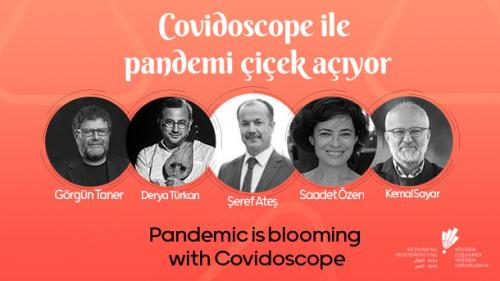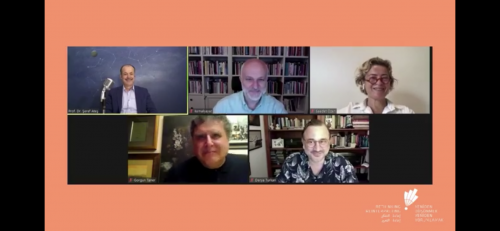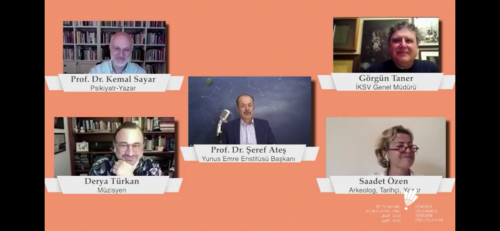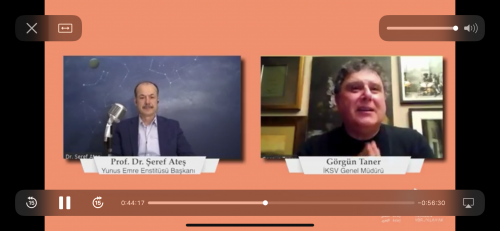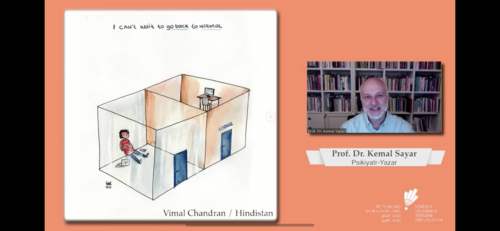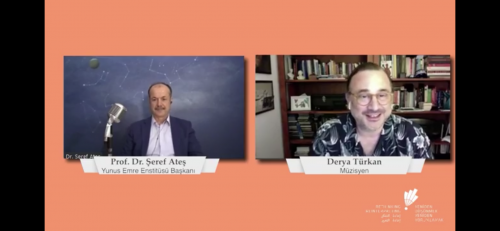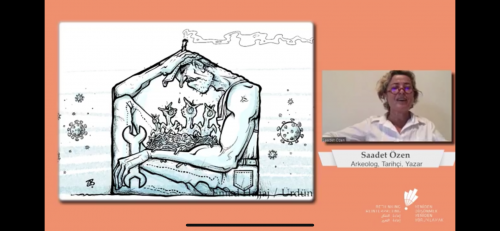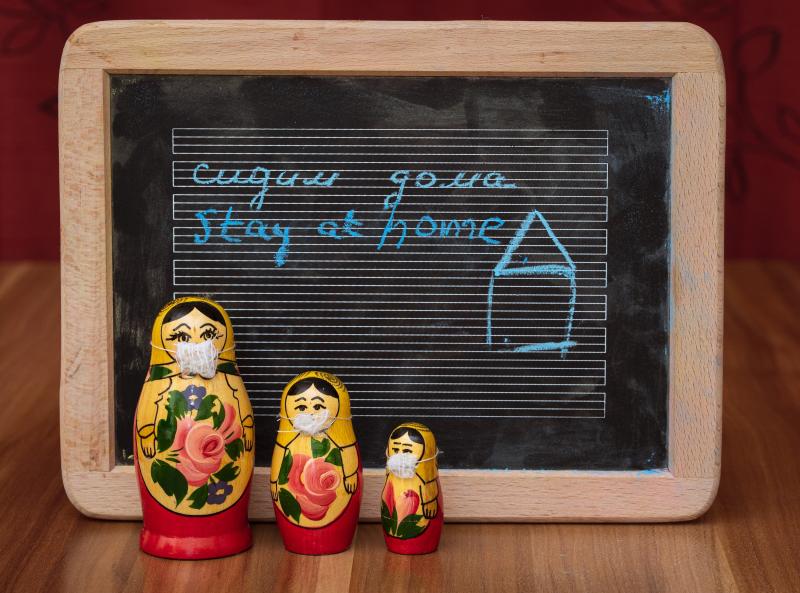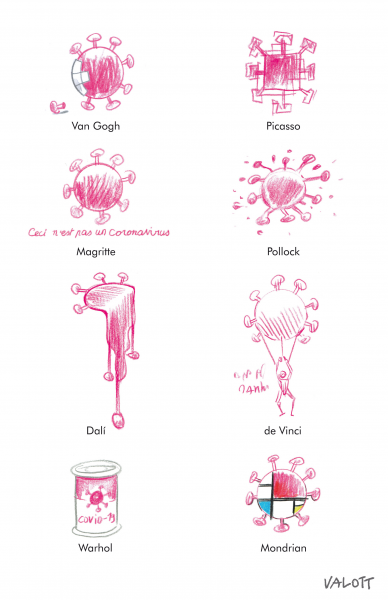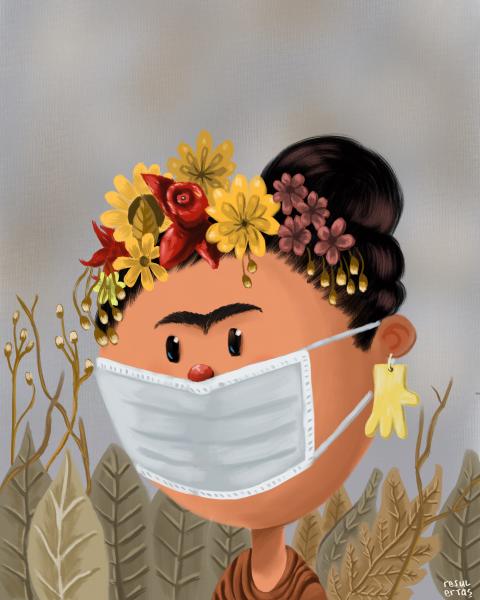The Pandemic is Blooming with Covidoscope
Yunus Emre Institute has hosted a seminar entitled "Art in the Pandemic and Covidoscope Project" with the participation of scholars, thinkers and artists as part of the "Rethinking, Reinterpreting" program. During the seminar, Psychiatrist Kemal Sayar delivered a speech. "At the moment, we are at a period when we need to start washing our souls, as well, because we have worries, we have fears, we are full of these concerns. Right at this point, art is just what we need to wash and purify the soul and bring the soul together with what is beautiful," he said.
|
|
Yunus Emre Institute has organized a seminar entitled "Art in the Pandemic and Covidoscope Project" within the context of the "Rethinking, Reinterpreting" program. During the seminar held on Thursday, June 11, the "Covidoscope" project, launched by the Institute with a view to strengthening the very spirit of unity and solidarity we need in order to overcome the hardships of the novel coronavirus pandemic, was discussed. During the event aired live simultaneously from the Institute's Instagram, Facebook and Twitter channels, the power of art to transform the world and human beings and how culture and art have been affected by the pandemic were discussed.
The seminar was moderated by Yunus Emre Institute President Prof. Dr. Şeref Ateş, and attended by Istanbul Culture and Art Foundation (İKSV) Director Görgün Taner, Psychiatrist and Writer Prof. Dr. Kemal Sayar, Archaeologist, Historian and Writer Saadet Özen, and Musician Derya Türkan.
İKSV Director Görgün Taner asserted that the culture sector was hit by the pandemic at the earliest and it would be the last to revive.
"NOW, WE HAVE A LARGER FRAMEWORK FOR THINKING"
Taner indicated that everyone was enchanted by the magic of online platforms in the early stages of the pandemic. "The museums that were made available online, cartoons, books... There were many inventions which I also participated. For examples, booksellers started holding auctions online on YouTube. In the past, only 25-30 people would go to their weekly auctions, but on YouTube, they started selling books to 300-500 people. In this period, they increased their business by 30-50 percent," he said.
Taner noted that everyone was familiar with the online content that had emerged.
|
|
Taner: We will neither go back to what it was before or we will deal with the completely novel. It will be what we call hybrid both the online and the physical; of course, we don't know when we go back to the physical, but they will go hand in hand. They will be impacted by each other. |
"After that, it was recognized that when we talk about culture and arts, emotions, physical contact, being together, expressing oneself in this manner, if you are a theater player, hearing the applause when you are on the stage, if you are a musician again, when you perform a very good solo, feeling that very good expression of your fellow musicians that you made music with, their value was understood once again. Although I am from an older generation, I see that for the upcoming period, we will neither go back to what it was before or we will deal with the completely novel. It will be what we call hybrid both the online and the physical; of course, we don't know when we go back to the physical, but they will go hand in hand. They will be impacted by each other," he said.
Taner underlined that recording became important after this process. "This was actually a different way of thinking on performing a culture and arts activity. Now, we have a larger framework when we are thinking of carrying out a cultural activity. This is what is before us: If something is happening here, how do we disseminate it throughout the world?" he asked.
Prof. Dr. Şeref Ateş noted that art starts first by designing something in the mind. Prof. Dr. Ateş asked whether at a time of shock, artists could come up with new designs or new ways of doing things, or they will be surrendered to the digital and technology. In response, Taner said: "I don't think we will be slaves to the digital. Yes, it will be the case to a certain extent. But, there will also be the case of being together physically with the audience and enjoying that feeling. We should never forget that looking back how we lived 100 years ago or how theaters or cinemas functioned, we would never imagine that we would be watching films on TV or a laptop," he said.
"WE ARE AT A PERIOD WHEN WE NEED TO WASH OUR SOULS"
Psychiatrist Kemal Sayar, on the other hand, talked about how human psychology is reflected in art. "At the moment, we are at a period when we need to start washing our souls, as well, because we have worries, we have fears, we are full of these concerns. So, we need these activities to feed the soul more than ever. We are all ears waiting for bad news. Right at this point, art is just what we need to wash and purify the soul and bring the soul together with what is beautiful," he said.
Sayar: Thanks to arts, we start seeing and realizing things that we have not seen or realized before. |
Sayar explained that art opens windows of tolerance for people. "Thanks to arts, we start seeing and realizing things that we have not seen or realized before," he said.
He added that art helps us to define the feelings that we cannot define ourselves.
"ART SHOWS US SHARING THE SAME FEELINGS"
Sayar asserted that during times of crisis such as the pandemic, art also creates opportunities for people to talk with each other.
Sayar: Art, indeed, shows us very well how this common feeling can be experienced, how we can understand each other, at what points we can better understand each other or what our common feelings could be and how we can be resistant, how we can be resilient towards this crisis. |
"Art helps different cultures to understand each other; it makes walls transparent. I think this pandemic is very important in one sense: at a time when 100 years passed after the last pandemic, the entire humanity is facing the same destiny. From the people in Amazon forests to those in the ghettos in India, everybody is feeling and sharing the same feelings against a common threat. Art, indeed, shows us very well how this common feeling can be experienced, how we can understand each other, at what points we can better understand each other or what our common feelings could be and how we can be resistant, how we can be resilient towards this crisis," he said.
|
|
Prof. Dr. Ateş: In this period, emotions are getting confessed again. Therefore, it (this period) can also be seen as going back to emotions. And I hope that Covidoscope will contribute to this. |
When thought turns into action, a feeling occurs. You confess what you are never courageous enough to confess. Then, you regret it or you feel ashamed. And that feeling of shame is registered in your unconscious. And in the next action, that feeling of shame is a definitive feeling. Although we call it rational thinking, we are actually acting on the basis of our emotions, both in the Western and Eastern world. So, in this period, emotions are getting confessed again. When we act with our emotions, when we say out of our hearts, it cannot be interpreted. Therefore, the rational thinking only provides us with a reason. When we dropped the tone of our voice, when we get excited, this is all about emotions. But our mind, rational thinking finds reasons for it... Therefore, it (this period) can also be seen as going back to emotions. In this regard, I am actually very happy in this period where all humanity is actually confessing their humanity and emotions by dropping down their masks and defining themselves as human beings and expressing this unity. And I hope that Covidoscope will contribute to this," he said.
Özen: "They have come up with them not knowing whether these works will be considered as normal works of art. However, at a time when the very definition of art has changed and the authorities have been shattered down, this gives both the audience and the artist a chance for rethinking. |
Archaeologist, Historian and Writer Saadet Özen gave information on the Institute's Covidoscope Project for building a global memory of the pandemic through arts. "They have come up with them not knowing whether these works will be considered as normal works of art. However, at a time when the very definition of art has changed and the authorities have been shattered down, this gives both the audience and the artist a chance for rethinking," Özen said, suggesting that the pandemic has offered an opportunity to question the essence of a work of art. Prof. Dr. Ateş noted that the works by artists from any part of the world can take part in the Covidoscope project without being endorsed by art authorities. "I, too, take part in, at least from our perspective. Indeed, Yunus Emre Institute is an organization that forges humanitarian bonds with the world. In this regard, reaching out to any artist in Brazil, Americas or Africa and ensuring his/her participation in our platform is both a different type of universality and a different type of democracy. Indeed, it is rather difficult to be endorsed by art authorities and make progress in the artistic world. Unfortunately, there is a hierarchy in place there. So, I see it as a very novel approach and support this initiative," he said.
Derya Türkan brought the perspective of an artist to the pandemic, talking about his projects. Türkan described a video clip designed in a digital environment with the participation of his wife Dilek Türkan and foreign artists. "Our life is full of travels and concerts. Actually, the pandemic has put in front of what we have repeatedly postponed. So we thought how we can turn this distress into advantages, learning something, working on something. This was the first period. In the second period, we started to ask how to turn them into products for art. Of course, within the limits of our capabilities. We increase our enthusiasm in this work and try to shot brief videos. During the pandemic, it occurred to me that this problem is not specific to this country. It affects the entire world. My friends in France, Spain, or the US have the same suffering. Indeed, they, too, give concerts and produce new artistic events to survive. They maintain both their psychology and their economy. So, in the past, we would see each other only from one concert to the other; now, we are in video chat virtually every day... Holding a video conference every day means that those people, too, need it. That is, everyone is affected by the same problem, and they share the same thoughts and views... That project has made them incredibly happy," he said.
COVIDOSCOPE IS BRINGING ART AND PEOPLE TOGETHER DURING THE PANDEMIC
The works of art in the "Covidoscope" project are produced simultaneously at a pivotal and meaningful moment, and they form an emotive diary of life during the pandemic. |
Threatening the health and well-being of individuals and society as a whole, the novel coronavirus pandemic also triggered a number of significant transformations in both the private sector, and the way certain processes are carried out in the public domain. In the state of uncertainty that descended, as people spent more time indoors and looking inwards, there was an accompanying increase in artistic expressions of how they felt. Through diverse inquiries, expressions, and techniques, both common feelings born of a shared global experience, and personal responses to it shaped in unique settings bore many varied fruits. Launched by Yunus Emre Institute, the "Covidoscope" project offers a special selection of interesting artistic works produced during the pandemic in diverse areas.
|
|
These products, brought together in the Institute's "Covidoscope" project, are produced simultaneously at a pivotal and meaningful moment, and form an emotive diary of life during the pandemic. Named as "Covidoscope" with inspiration from a kaleidoscope, the project provides a digital collection, created with a special emphasis on common feelings.
|
|
Tiffany Watt Smith, the writer of "The Book of Human Emotions," Historian Saadet Özen and Prof. Dr. Kemal Sayar are among the many people providing consultancy for the project. Inspired by the multifarious, shifting, harmonious reflections of vivid colors seen through a kaleidoscope, the project seeks to create a global pandemic memory bank which includes both commonalities, and subjective expressions.
The Covidoscope project will host a special collection of caricatures, animations, online concerts, compositions, literary expressions and comments and solidarity movements that will be part of the collective memory. |
The project documents the most popular aesthetic works that are representative of the pandemic period. The caricatures, animations, online concerts, compositions, solidarity movements, and literary expressions and comments, curated from around the world, will be part of the Covidoscope collection. One section of the "Covidoscope" collection shall be dedicated to widely acclaimed, outstanding examples of artistic works and aesthetic creations from around the globe. Other sections will include the works depicting emotions and themes. The project will reflect the similar emotive journeys of human beings along with the global archive.
The project underlines the solidarity formed between people grappling with the same unanticipated ordeals, and the integrating quality of emotional experiences, and the archive formed shall be shared on the website in multiple languages at the website http://www.covidoscope.org, which will go online by late June.

